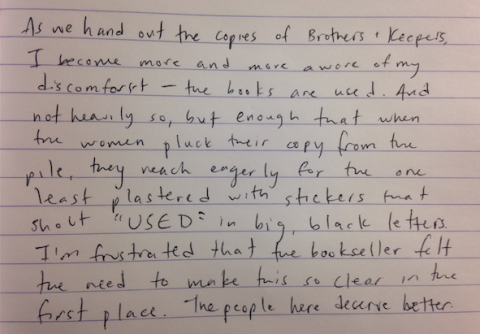Ecological Intelligence
By TralfamadorianDecember 6, 2015 - 13:28

Serendip is an independent site partnering with faculty at multiple colleges and universities around the world. Happy exploring!


In the anthropogenic age, it has become vital for mankind to protect the environment. C.E. Bowers who wrote "Steps to the Recovery of Ecological Intelligence", Bruno Latour who wrote "Agency at the Time of the Anthropocene", Van Jones, the thinker behind "Greening the Ghetto", Jenny Cameron, Stephen Healy, and J.K.

Essay #12
December 3, 2015
Bryn Mawr Lies on Our Ecological Intelligence

Do We Own Our Thoughts?
Both Stacy Alaimo and Paulo Freire do not mention “ecological intelligence” explicitly, but they both support ecological intelligence as an awareness of and resulting from the porous bodies and permeable membranes that prevent the complete separation of humans from all other bodies. I will look at the permeable membranes of the different classroom locations, the students (me included) and Anne themselves, and the words we use and lack thereof. Also, I will explore the role that the power dynamics described by Alaimo and the classroom hegemony in our class and described by Freire plays into ecological intelligence.

Alison
ESem Paper #12
December 6, 2015
Thinking Ecologically with Economics

Elena Luedy
Professor Cohen
E-SEM
12/6/15
Ecological Intelligence

Aayzah Mirza
Paper 8
December 5, 2015

Validating Bodies
We cannot seem to go without analysis in this class, in this 360. We thrive in it; it engenders our thinking about our experiences in the prison within the context of the larger narrative. We need it in order to affirm to ourselves that the affect of our presence, regardless of what our intentions may be, is empowering. In this essay, I explore the true purpose of higher education in prison, the kind of education that I advocate for, and the reasons behind this.
Ideologies of merit, deservingness, and blame embedded within and influencing the prison industrial complex are often entangled with, both physically and mentally, the body. This is a concept that I explored in my earliest Sunday reflection post on September 13th:

Books Are My Internet:
Text as Mutable Technology & Reading as Radical Practice

A Saturday morning reflection on the events of the day before, in the prison.

“The point of living in the epoch of Anthropocene is that all agents share the same shape-changing destiny, a destiny that cannot be followed, documented, told, and represented by using any of the other traits associated with subjectivity or objectivity” (P15).
Latour insists on his conception that what exists in this planet is all animated and we are all protagonists of a geo-story. However he claims that this geo-story has been ruined by human-beings, who are deanimating the whole organism. If we as human-beings ignore other species as “others” those others will be killed, however if we care about them as our “peers” we could progress the way to maintain this ecology.